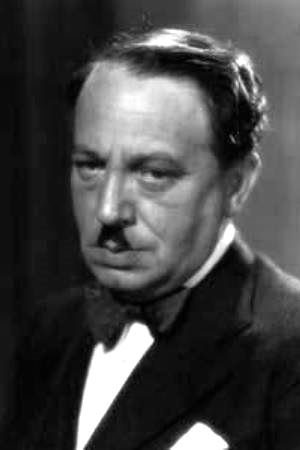
1885-04-19 ( 140 years old ) in Érsekújvár, Austria-Hungary (now Slovakia)
Gyula Gózon (19 April 1885, Nové Zámky – 8 October 1972, Budapest) was a Hungarian actor and comedian.
Gyula Gózon was born on 19 April 1885, in Nové Zámky, but grew up in Esztergom. With the mentoring of his brother, he could fulfill his dream of learning to be a singer actor at the actor school of Szidi Rákosi in Budapest. After graduating, he joins a group touring the southern part of the country, often working under harsh conditions, changing location and repertory often. During this period he has the chance to polish his prosaic capabilities, one that was omitted in Rákosi's school. After playing in Târgu Mureş and Miercurea Ciuc, he gains the attention of Miklós Erdélyi, the director of Oradea's theater, who offers him contract in 1904. He plays here for six years, and befriends Gyula Kabos, forming a lifelong comradeship, and comedic duo. In 1912 Endre Nagy offers him to join his newly forming Cabaret (Apolló theatre) in Budapest, followed by years working in the Népopera and Király Theatre. Gózon accepted his first movie role in 1914 (the silent film A becsapott újságíró), appearing nearly a hundred during his lifetime. In 1917 he marries Lili Berky, with whom he starts the Muskátli Cabaret, often appearing on stage together. After the venture failed in 1920, he joins the Belvárosi Theatre in 1927, followed by the Új Theatre two years later.
With Gyula Kabos he gets a role in Kék Bálvány, Hungary's first major motion picture, and like his mate, Gózon quickly becomes a much used actor of the emerging movie industry, appearing in the first hits of Budapest's theatres, like Hyppolit a lakáj or Meseautó. In 1935, along with his wife, he is contracted to the National Theatre). On the account of Jew-laws, he is banned from work in 1941, followed by years of hiding in his Rákosliget home during World War II. In 1945 Gózon re-joins the National Theatre, enjoying a second flowering of his career for a decade. After his wife's death in 1958, the health of the now 73-year-old actor began to fail, and seven years after his last appearance in the National Theatre, he died on 8 October 1972.
Gyula Gózon is one of the few entertainers who could be successful and active all along the years of the Monarchy, the Horthy regime, and the Communist rule. Throughout his long career, he appeared in over 90 movies (including silent ones), and was both a pioneer and master of the Hungarian Cabaret. He received the Kossuth Prize in 1954. His former home in Rákosliget is now home to the Gózon Gyula Repertory Theater, opened in 2005.
Description above from the Wikipedia article Gyula Gózon, licensed under CC-BY-SA, full list of contributors on Wikipedia.
Movies
Skylark
1965-04-05
New Gilgames
1963-03-02
I'll Appeal to the Minister
1962-02-15
Until the Day is Breaking
1962-01-01
Just a Joke
1961-11-30
Guns and Doves
1961-09-13
Három csillag
1960-03-31
Pár lépés a határ
1959-11-26
Yesterday
1959-08-18
Adventure in Gerolstein
1957-09-19
The Football Star
1957-09-12
A Strange Mark of Identity
1955-10-13
Me and My Grandpa
1954-11-18
Keep Your Chin Up!
1954-08-19
The Birth of Menyhért Simon
1954-01-21
Relatives
1954-01-01
The Day of Wrath
1953-11-12
Young at Heart
1953-04-09
The State Department Store
1953-01-23
Try and Win
1952-02-24
Tüzkeresztség
1952-02-23
A Strange Marriage
1951-08-12
Mrs. Déry
1951-06-06
Honour and Glory
1951-04-12
Singing Makes Life Beautiful
1950-07-08
Janika
1949-05-19
Könnyű múzsa
1947-11-30
Hazugság nélkül
1946-08-29
The Gold Watch
1946-03-14
The School-Mistress
1945-08-12
Love Is Not a Shame
1940-12-18
Rosewood Cane
1940-11-25
Semmelweis
1940-01-12
Erdélyi kastély
1940-01-01
The Lady is a Little Crazy
1938-10-11
Friday Rose
1938-09-30
Thirteen Girls Smile at the Sky
1938-06-10
Az ember néha téved
1938-02-10
Young Noszty and Mary Toth
1938-01-20
Egy lány elindul
1937-12-23
My Daughter Is Different
1937-11-14
Lovagias ügy
1937-02-11
Sister Maria
1937-01-05
Segítség, örököltem!
1937-01-01
Three Spinsters
1936-10-29
Sweet Stepmother
1935-10-14
Nem élhetek muzsikaszó nélkül 1935
1935-04-29
Thanks for Knocking
1935-04-19
Villa for Sale
1935-04-10
Az iglói diákok
1935-02-21
The Dream Car
1934-12-14
Jo Az Oreg A Haznal
1934-11-29
The New Relative
1934-11-06
Purple Lilacs
1934-09-06
Ida regénye
1934-03-15
A Night in Venice
1934-01-12
Rákóczi induló
1933-11-23
Pardon, tévedtem
1933-10-23
Spring Shower
1932-11-04
Kiss Me Darling!
1932-03-05
Hyppolit, the Butler
1931-11-27
The Blue Idol
1931-07-08
Thief as Detective
1916-03-14
Powered by Powerxsoft Ltd using the TMDB API

